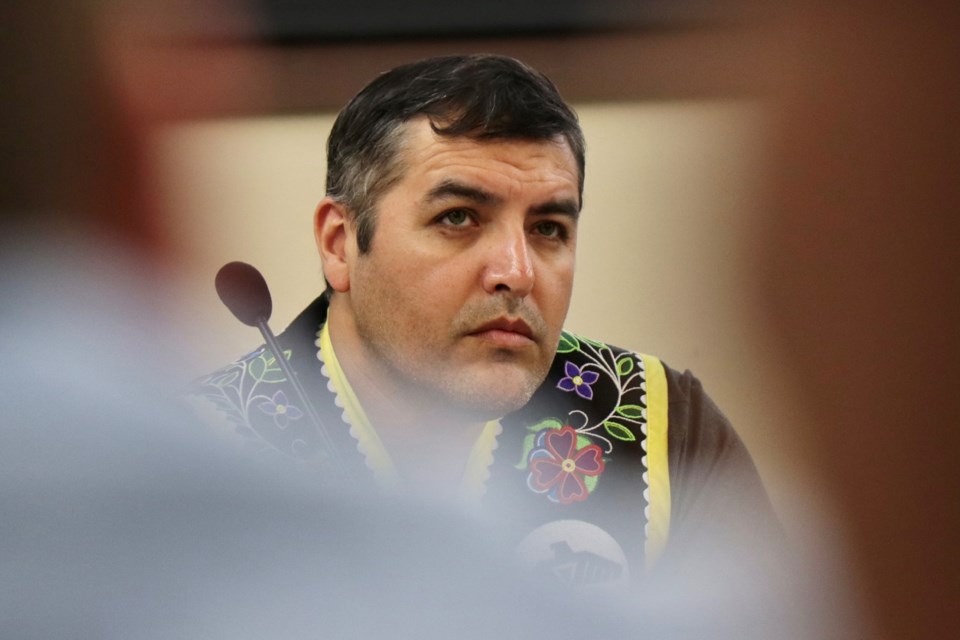Northern Ontario Indigenous policing services say they could run out of community funding within the month if deadlocked negotiations with the federal government are not resolved.
The political bodies overseeing the police services, including the Indigenous Police Chiefs of Ontario (IPCO), state their negotiations with Public Safety Canada are disingenuous, and based on a funding system that discriminates against Indigenous people.
The impasse involves the administration of funding through the First Nations and Inuit Policing Program (FNIPP) a federal/provincial cost-sharing initiative that has created nearly 40 Indigenous police forces across Canada in the last 30 years.
The three police services currently without funding — Treaty Three Police Service, the UCCM Anishnaabe Police Service and Anishinabek Police Service — currently cover 45 First Nations with a combined population of around 30,000 people. Their funding expired on March 31, and they have been operating from community funds since.
On June 8, the political leadership of the Anishinabek Nation, which represents more than 30 Ontario First Nations declared states of emergency in affected communities over the impasse. This followed a May 24 emergency declaration from Grand Council Treaty Three, representing 28 First Nations in Northwestern Ontario, and the United Chiefs and Councils of Mnidoo Mnising, an Anishinaabe community justice program in M’Chigeeng on Manitoulin Island, which declared a state of emergency on May 31.
All contend the federal government is engaging in “oppressive and unconscionable” bargaining tactics. The emergency declaration by the United Chiefs and Council of Mnidoo Mnising alleges that government officials are “deliberately allowing FNIPP funding agreements to expire in order to force Indigenous communities to accept Canada’s discriminatory terms.”
Under the FNIPP, there are two types of funding: Community Tripartite agreements (CTA), in which the RCMP provides policing to a community; or self-administered police service agreements (SA), where a First Nation or Inuit community manages its own service under provincial policing legislation.
The funding is cost-shared, 52 per cent by the federal government and 48 per cent by the province and is administered jointly by Public Safety Canada and the Ontario Ministry of the Solicitor General.
Unlike non-Indigenous communities across Canada, where policing operates as an essential service, funding agreements under the FNIPP are negotiated between Public Safety Canada, the province and the First Nations. Indigenous police forces also operate on fixed-term government grants, which require regular negotiation.
To remedy the funding crisis, the Indigenous Police Chiefs of Ontario (IPCO) drafted a motion in early May, seeking interim relief under the Canadian Human Rights Act (CHRA). IPCO represents the nine SA First Nation Police Services in Ontario, including the three at issue, and alleges discrimination contrary to Section 5 of the CHRA. They say it is “discriminatory provision of service.”
The motion asks the respondent, Public Safety Canada, to immediately reinstate funding that expired March 31 for the three First Nations police services; issue an order to suspend the effect of Section 6 of the FNIPP, as well as relieve all First Nations police services represented by IPCO from compliance with this section.
Section 6 details the ‘Terms and Conditions’ of the funding and specifically, with the ineligible expenses under the FNIPP, regulations that are unique to First Nations and Inuit police services.
The section blocks Indigenous police services from accessing specialized service, such as a canine unit or emergency response teams, as well as costs related to loans and legal advice. IPCO’s filing said this prevents First Nation police services from owning infrastructure (such as a police detachment) and from recouping expenses related to legal advice in negotiating the FNIPP.
These legal actions state that First Nation police forces consider the government’s bargaining to be a take-it-or-leave-it approach. In the motion, they refer to Public Safety Canada’s “unconscionable bargaining tactics.”
The motion states the FNIPP has already been found to be discriminatory in Quebec-based cases: Dominique (on behalf of members of Pekuakamiulnuatsh First Nation) v. Public Safety Canada, and the appeal of that decision, the Canada v. Première Nation des Pekuakamiulnuatsh which upheld the earlier finding the FNIPP prevents First Nations from benefiting from the same quality of policing available to non-Indigenous communities in comparable circumstances.
The First Nations police services now look to renegotiate these terms, and expand their abilities.
But the federal government response directs focus to the fact that the FNIPP is a ‘discretionary contribution program’, and therefore it will not discuss taking on such added costs. Ottawa also states that it has no mechanisms to move money to First Nations police forces that currently do not have any formal agreements in place, because the previous ones have expired.
The decision to declare a state of emergency was made during the Anishinabek Nation Grand Council Assembly on June 7, with Chief Patsy Corbiere of Aundeck Omni Kaning First Nation moving the resolution and seconded by Chief Lloyd Myke of Magnetawan First Nation.
“The Anishinabek Nation declares a State of Emergency to compel Canada to recognize and rectify the systemic barriers and discriminatory practices within the funding models of FNIPP,” reads a release from the Anishinabek Chiefs-in-Assembly. “Addressing the chronic underfunding of First Nation policing is vital to mitigate systemic inequalities, reduce crime rates, and ensure the safety and security of Anishinabek Nation communities.”
They are demanding support for policing services as well as advocating for an ‘essential police service’ designation, allowing them to receive funds as any non-Indigenous police service would.
They have stated that if significant progress is not made by Aug. 1, “the Anishinabek Nation will prepare a litigation action plan to ensure the protection of rights and justice for Indigenous communities.”
The motion from IPCO will be heard on June 14 at 9:30 a.m.
Jenny Lamothe is a reporter with Sudbury.com.



